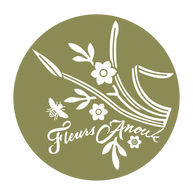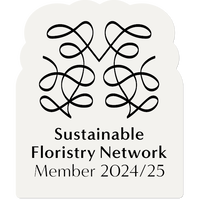Sustainability
Fleurs Anouk is passionate about protecting nature and biodiversity, and about producing beautiful floral designs that are as kind as possible to the planet. I am committed to following sustainable floristry practices, to educating clients about the significant environmental damage that is caused by the global floristry industry, and to helping them to make informed choices. There are numerous challenges, which include:
The Sustainable Floristry Network has identified the following sustainable floristry principles to help florists become more sustainable in their practice:
- The huge carbon footprint of flowers grown in heated glasshouses in Europe and the carbon footprint of flowers grown for export in the global south ( Kenya, Columbia, Ecuador etc.). The flowers are refridgerated and transported across the world to enable customers to have flowers all year round. For example, a florist ordering flowers in NY through a Dutch wholesaler could see flowers grown in Columbia go to Amsterdam first to be consolidated with other flowers in the order before being flown to NY. A round trip of will get those flowers may get Columbian grown flowers which go first to Amsterdam and then to NY;
- The widespread use of pesticides and other chemicals for flower growing, harsh chemicals used to create commercially dyed dried flowers, and bleach used by florists to clean buckets;
- The endemic waste and use of single-use plastics in the wedding and events industry and in floral packaging;
- Poor post-consumer recycling of materials including single-use plastics, wires, microplastics from floral foam, and harsh chemical dyes used on flowers – all of which will end up in landfill;
- Insecure seasonal work, often poor working conditions and low- wages across the industry.
The Sustainable Floristry Network has identified the following sustainable floristry principles to help florists become more sustainable in their practice:
- Choosing better flowers
- Designing out waste
- Investing in Ethics
- Communicating with customers and community
The Fleurs Anouk practice
Flowers
All Fleurs Anouk designs are season-led. This means that most of the year you can rely on the freshest, locally grown flowers in all my arrangements. These are sourced from a network of trusted, experienced, local and pesticide-free flower growers in Cambridge and East Anglia. Designs are supplemented with imported wholesale flowers when locally grown flowers are not available.
Materials
Fleurs Anouk never uses plastic-based floral foam. All arrangements are made using eco-friendly materials such as water and chicken wire (which is re-used after events) along with twigs, meulenbeckia, responsibly sourced moss, string and bamboo pins. Biodegradable or re-usable trays and containers are used for table designs .
Fleurs Anouk uses glass vases that can be recycled for use in other events. Where plastic containers are used instead of biodegradable containers, they are re-used or recycled. Test-tubes are recycled.
All Fleurs Anouk farewell flowers are fully biodegradable and suitable for natural burial sites.
Fleurs Anouk offers to collect containers from customers for re-use. Bouquets are delivered in cardboard boxes or other containers that can be recycled. Hay, brown paper and newspaper are used as packaging for posting dried arrangements.
Packaging
I package my designs in recyclable cardboard gift boxes and use hay, wool and newspaper as protection for posting dried arrangements. I am researching the provenance of all my wrapping and packaging and will switch to FSC certified, as and if, necessary.
Travel Miles
Fleurs Anouk does not accept commissions that are further than 1.5 hours travelling time from Cambridge.
Constant Improvement - working towards a more sustainable future
I am continually looking for ways to improve the sustainability of my practice. Currently, I am researching suppliers of British flowers across the UK to source more British flowers throughout the year. I am exploring alternatives to fibre floral, which is a natural product made of basalt but treated at high heat. I am also experimenting with using string instead of reel wire for making winter wreaths and biodegradable glues.
All Fleurs Anouk designs are season-led. This means that most of the year you can rely on the freshest, locally grown flowers in all my arrangements. These are sourced from a network of trusted, experienced, local and pesticide-free flower growers in Cambridge and East Anglia. Designs are supplemented with imported wholesale flowers when locally grown flowers are not available.
Materials
Fleurs Anouk never uses plastic-based floral foam. All arrangements are made using eco-friendly materials such as water and chicken wire (which is re-used after events) along with twigs, meulenbeckia, responsibly sourced moss, string and bamboo pins. Biodegradable or re-usable trays and containers are used for table designs .
Fleurs Anouk uses glass vases that can be recycled for use in other events. Where plastic containers are used instead of biodegradable containers, they are re-used or recycled. Test-tubes are recycled.
All Fleurs Anouk farewell flowers are fully biodegradable and suitable for natural burial sites.
Fleurs Anouk offers to collect containers from customers for re-use. Bouquets are delivered in cardboard boxes or other containers that can be recycled. Hay, brown paper and newspaper are used as packaging for posting dried arrangements.
Packaging
I package my designs in recyclable cardboard gift boxes and use hay, wool and newspaper as protection for posting dried arrangements. I am researching the provenance of all my wrapping and packaging and will switch to FSC certified, as and if, necessary.
Travel Miles
Fleurs Anouk does not accept commissions that are further than 1.5 hours travelling time from Cambridge.
Constant Improvement - working towards a more sustainable future
I am continually looking for ways to improve the sustainability of my practice. Currently, I am researching suppliers of British flowers across the UK to source more British flowers throughout the year. I am exploring alternatives to fibre floral, which is a natural product made of basalt but treated at high heat. I am also experimenting with using string instead of reel wire for making winter wreaths and biodegradable glues.

